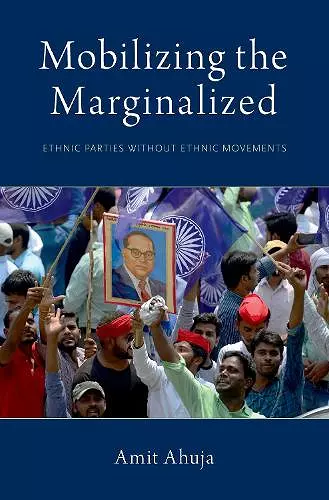Mobilizing the Marginalized
Ethnic Parties without Ethnic Movements
Format:Hardback
Publisher:Oxford University Press Inc
Published:12th Aug '19
Currently unavailable, and unfortunately no date known when it will be back
This hardback is available in another edition too:
- Paperback£22.49(9780190916435)

India's over 200 million Dalits, once called "untouchables," have been mobilized by social movements and political parties, but the outcomes of this mobilization are puzzling. Dalits' ethnic parties have performed poorly in elections in states where movements demanding social equality have been strong while they have succeeded in states where such movements have been entirely absent or weak. In Mobilizing the Marginalized, Amit Ahuja demonstrates that the collective action of marginalized groups--those that are historically stigmatized and disproportionately poor — is distinct. Drawing on extensive original research conducted across four of India's largest states, he shows, for the marginalized, social mobilization undermines the bloc voting their ethnic parties' rely on for electoral triumph and increases multi-ethnic political parties' competition for marginalized votes. He presents evidence showing that a marginalized group gains more from participating in a social movement and dividing support among parties than from voting as a bloc for an ethnic party.
Armed with substantial research and possessing intellectual energy to challenge conventional wisdom, Amit Ahuja provides a convincing counterpoint to fallacious understandings of the layered relationship between self-assertion movements and ethnic electoral mobilization. * Telegraph *
This book is a brilliant contribution to three central themes in the study of Indian politics. It busts the long cherished myth that castes vote as a bloc or that it is rational for them to do so. It provides the new account of the relationship between social movements and electoral politics. It is also a deeply thoughtful and empirically grounded contribution to thinking about the political agency and subjectivity of marginalized groups. With its innovative research design, Mobilizing the Marginalized has opened up lines of inquiry that will transform our thinking about caste and politics in India. * Pratap Bhanu Mehta, Vice-Chancellor, Ashoka University *
Why do lower castes mobilize successfully in some states and not others? In this terrific book, Amit Ahuja shows how the legacies of previous mobilizing efforts combine with party organization (e.g. the ability to campaign door to door, and knowing which symbols to choose) and patterns of party competition to determine whether Dalit politicians and parties will thrive. A wonderful study that combines micro-fieldwork with big ideas. * Steven Wilkinson, Nilekani Professor of Political Science, Yale University *
This book embarks on an important intellectual enterprise that crosses disciplinary boundaries. No wonder, then, that Ahuja arrives at an argument differing from much prior research that emphasizes how social movements sustain, rather than undermine, allied political parties. Ahuja expertly relies on an eclectic array of evidence, ranging from public opinion data to a survey experiment to sustained field research that includes scores of interviews and focus groups. Ahuja deftly distills lessons from his extensive fieldwork, which helps make this a volume of serious scholarship that is unusually readable and accessible. * Perspectives of Politics *
Amit Ahuja's Mobilizing the Marginalized (Oxford University Press) is a brilliant study of the interface between Dalit social and political movements. * Open Magazine *
Mobilizing the Marginalized is a theoretically rich book grounded in solid empirics that addresses important puzzles surrounding the social and political mobilization of India's Dalits. Bringing the agency of Dalits to the forefront of its analysis, it joins others studies connecting subaltern social movements with democratic politics and accountability in India. It also speaks to comparative literature on the mobilization of marginalized groups and offers fruitful avenues for investigating the experiences of marginalized groups outside of India. * Berkeley's South Asia Research Group's -- South Asia blog *
a valuable contribution to the study of South Asian politics. * B. E. Donovan, University of Iowa, CHOICE *
- Winner of Winner of the Kamaladevi Chattopadhyay Prize for best non-fiction from the New India Foundation.
ISBN: 9780190916428
Dimensions: 160mm x 236mm x 18mm
Weight: 528g
266 pages